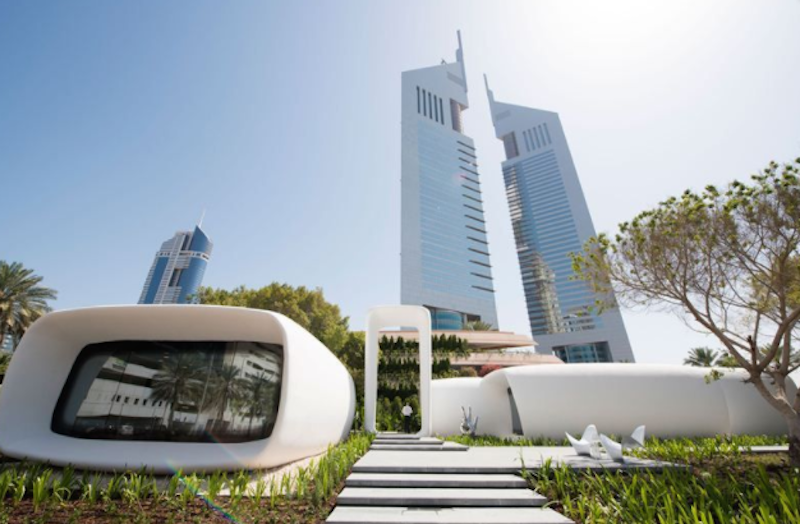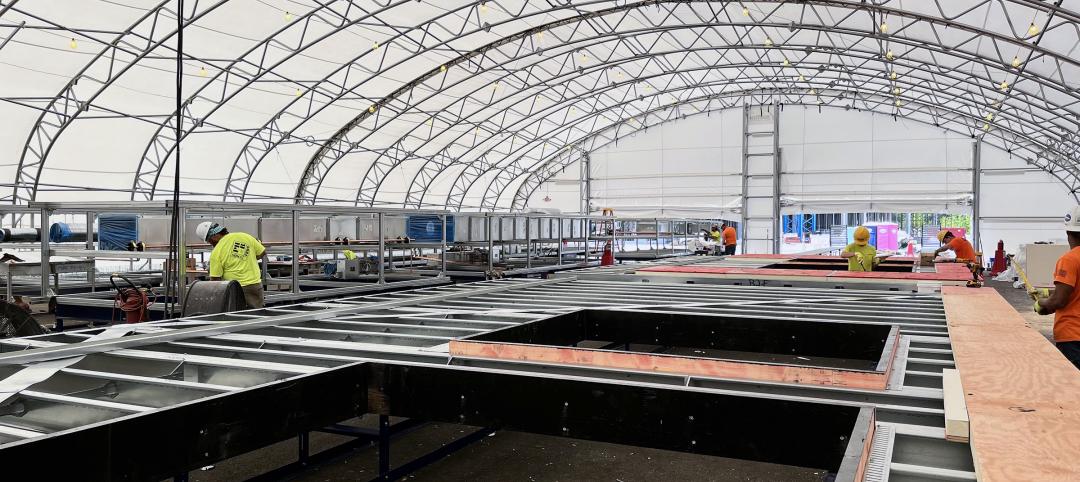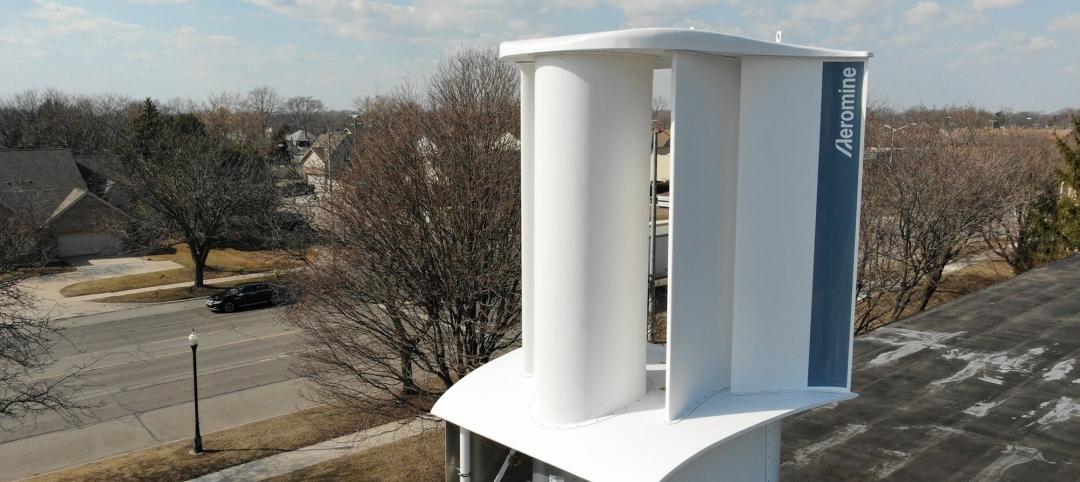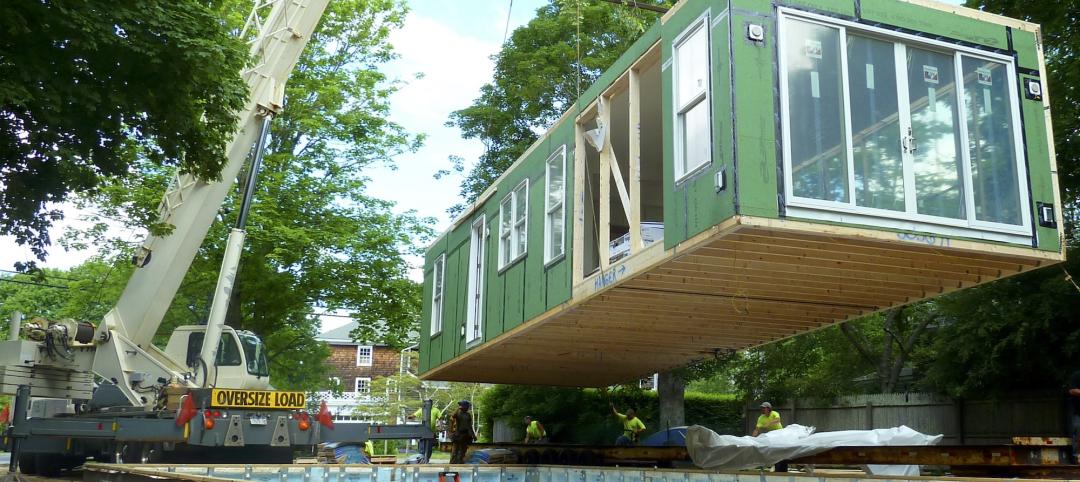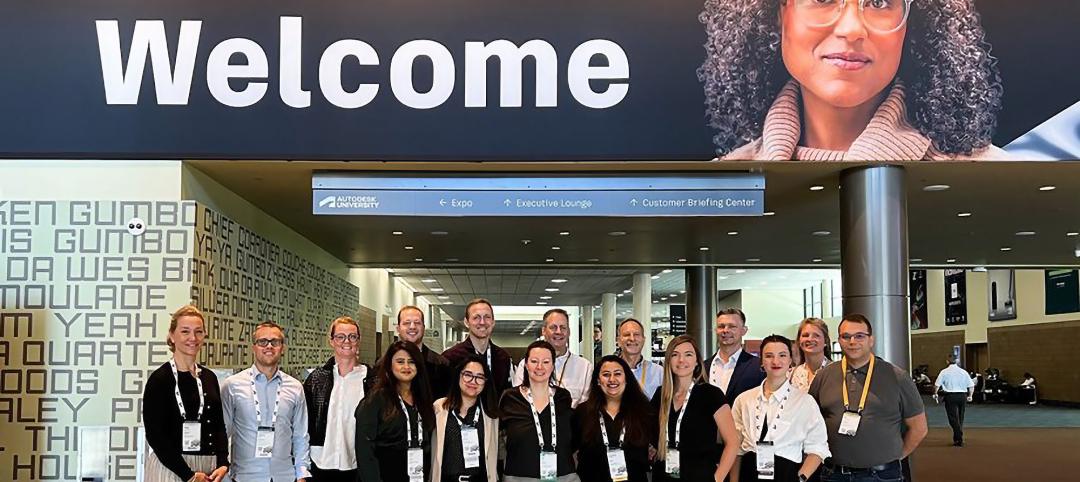Last April, Dubai unveiled its 3D Printing Strategy, which calls for 25% of buildings in that city to be constructed using 3D printing technology by 2030. That strategy focuses on three major sectors: construction, medical products, and consumer products. The use of 3D printing in Dubai’s construction sector will increase by 2% starting in 2019.
One month after the strategy was publicized, Dubai completed what it asserts is the world’s first 3D-printed office, a 250-sm (2,691-sf) building made from a mixture of cement and other building materials, and assembled in 17 days by a 3D printer measuring 20 feet high, 120 feet long, and 40 feet wide, with a automated robotic arm.
Can a 3D-printed city be too far behind? The answer might lie in the Minitank, a 3D-printing crane under construction that its developer, a Silicon Valley startup called Cazza Construction Technologies, says can layer 2,153 sf of concrete per day, which would make it 50% faster than conventional construction methods.
Cazza’s 19-year-old CEO and co-founder Chris Kelsey tells CNN that construction is the natural progression for 3D printing. Last year, the Dubai Road and Transport Authority invited Cazza to present its technology to government officials overseeing the 3D Printing Strategy initiative. “Out of all of the groups they’d seen online or spoken with, they were most fascinated with the capabilities of our unique machines,” Kelsey told ConstructionWeekOnline.com.
It remains to be seen, though, whether this technology is practical for large-scale projects. There’s not much information about Cazza’s origins or its technology on its website, nor any images of the Minitank. (The site, however, is opening soliciting for partners and distributors for its technology.) Previously, Kelsey founded a company called Appsitude, an app development company. Part of Cazza’s funding came from proceeds of Appsitude’s sale last year.
Cazza, though, is undeniably following in the footsteps of pioneers who have tested the limits of 3D printing for construction. These include Behrokh Khoshnevis, a professor at the University of Southern California, who invented a concrete-extruding 3D printer in 2009 that could print a 2,500-sf structure in 20 hours; the construction firm WinSun, which in 2014 3D printed 10 one-story houses in a single day; and DUS Architects, which last year 3D printed a full canal house in Amsterdam.
Cazza’s process is relatively straightforward: an architect would upload blueprints onto a computer system, which transmits the information to the crane printer that layers the concrete in the shape of the design.
The Minitank, if it becomes operational, will be able to print on-site, and construct buildings up to three stories high. “The barrier to companies [printing on-site] so far has been that it’s extremely difficult to develop a machine with all of the factors needed,” Kelsey explained.
The Minitank would use cement made from 80% recycled materials. Cazza claims that its portable equipment can be set up within 30 minutes, and that its process would reduce labor and materials costs by up to 90%. Fernando De Los Rios, Cazza’s COO, said his company would soon bring its engineers from across the world to start working in Dubai and surrounding areas.
Dubai’s Roads and Transport Authority has several 3D printed projects in the works already, including the Museum of the Future, and DEWA’s labs in the Mohammed Bin Rashid Al-Maktoum Solar Park.
Related Stories
Project + Process Innovation | Mar 22, 2023
Onsite prefabrication for healthcare construction: It's more than a process, it's a partnership
Prefabrication can help project teams navigate an uncertain market. GBBN's Mickey LeRoy, AIA, ACHA, LEED AP, explains the difference between onsite and offsite prefabrication methods for healthcare construction projects.
Building Tech | Mar 14, 2023
Reaping the benefits of offsite construction, with ICC's Ryan Colker
Ryan Colker, VP of Innovation at the International Code Council, discusses how municipal regulations and inspections are keeping up with the expansion of off-site manufacturing for commercial construction. Colker speaks with BD+C's John Caulfield.
Student Housing | Mar 13, 2023
University of Oklahoma, Missouri S&T add storm-safe spaces in student housing buildings for tornado protection
More universities are incorporating reinforced rooms in student housing designs to provide an extra layer of protection for students. Storm shelters have been included in recent KWK Architects-designed university projects in the Great Plains where there is a high incidence of tornadoes. Projects include Headington and Dunham Residential Colleges at the University of Oklahoma and the University Commons residential complex at Missouri S&T.
AEC Innovators | Mar 3, 2023
Meet BD+C's 2023 AEC Innovators
More than ever, AEC firms and their suppliers are wedding innovation with corporate responsibility. How they are addressing climate change usually gets the headlines. But as the following articles in our AEC Innovators package chronicle, companies are attempting to make an impact as well on the integrity of their supply chains, the reduction of construction waste, and answering calls for more affordable housing and homeless shelters. As often as not, these companies are partnering with municipalities and nonprofit interest groups to help guide their production.
Modular Building | Mar 3, 2023
Pallet Shelter is fighting homelessness, one person and modular pod at a time
Everett, Wash.-based Pallet Inc. helped the City of Burlington, Vt., turn a municipal parking lot into an emergency shelter community, complete with 30 modular “sleeping cabins” for the homeless.
Multifamily Housing | Mar 1, 2023
Multifamily construction startup Cassette takes a different approach to modular building
Prefabricated modular design and construction have made notable inroads into such sectors as industrial, residential, hospitality and, more recently, office and healthcare. But Dafna Kaplan thinks that what’s held back the modular building industry from even greater market penetration has been suppliers’ insistence that they do everything: design, manufacture, logistics, land prep, assembly, even onsite construction. Kaplan is CEO and Founder of Cassette, a Los Angeles-based modular building startup.
Sustainability | Feb 8, 2023
A wind energy system—without the blades—can be placed on commercial building rooftops
Aeromine Technologies’ bladeless system captures and amplifies a building’s airflow like airfoils on a race car.
Multifamily Housing | Feb 3, 2023
HUD unveils report to help multifamily housing developers overcome barriers to offsite construction
The U.S. Department of Housing and Urban Development, in partnership with the National Institute of Building Sciences and MOD X, has released the Offsite Construction for Housing: Research Roadmap, a strategic report that presents the key knowledge gaps and research needs to overcome the barriers and challenges to offsite construction.
Healthcare Facilities | Jan 31, 2023
How to solve humidity issues in hospitals and healthcare facilities
Humidity control is one of the top mechanical issues healthcare clients face. SSR's Lee Nordholm, PE, LEED AP, offers tips for handling humidity issues in hospitals and healthcare facilities.
AEC Tech | Jan 27, 2023
Key takeaways from Autodesk University 2022
Autodesk laid out its long-term vision to drive digital collaboration through cloud-based solutions and emphasized the importance of connecting people, processes and data.


